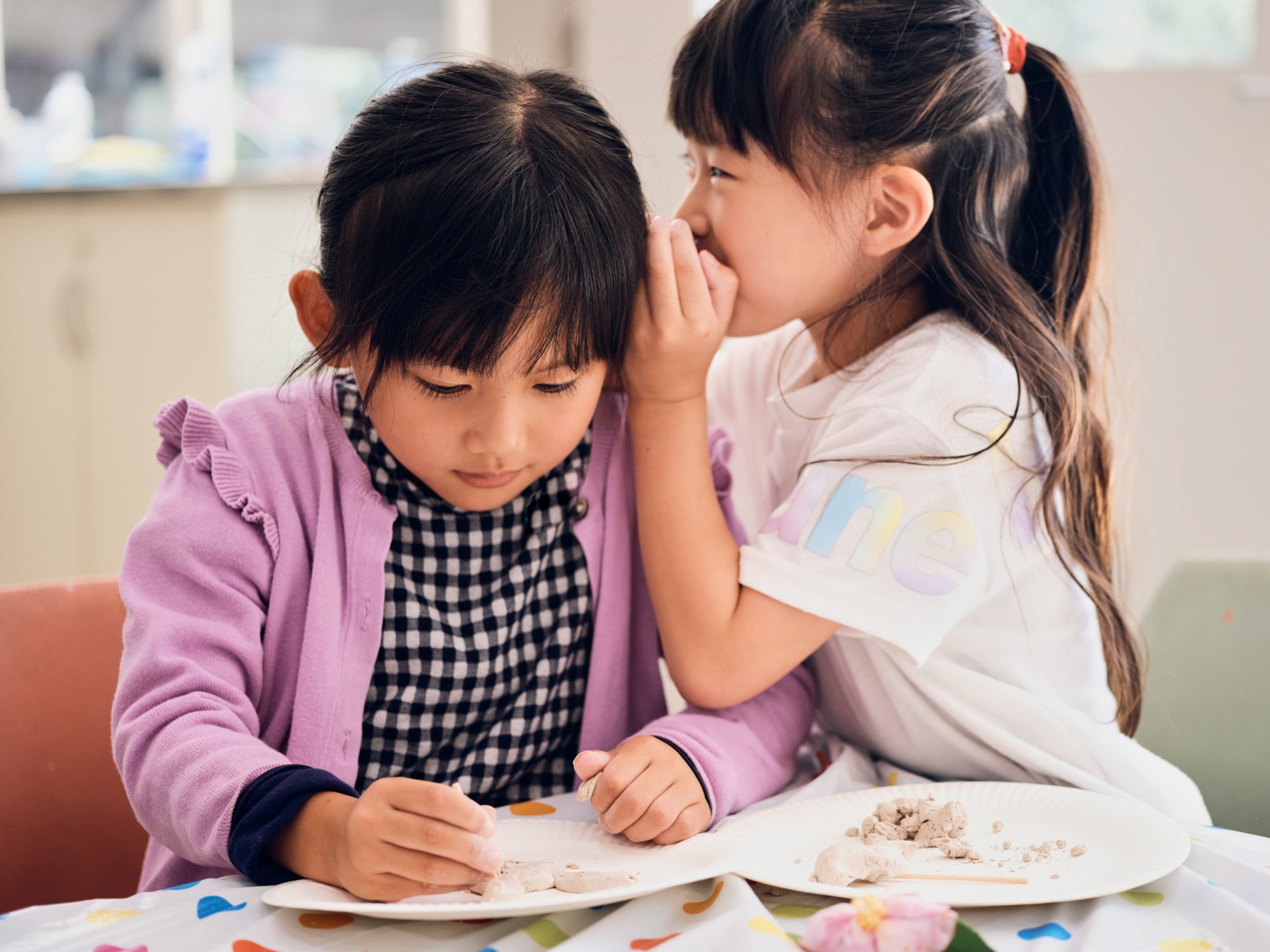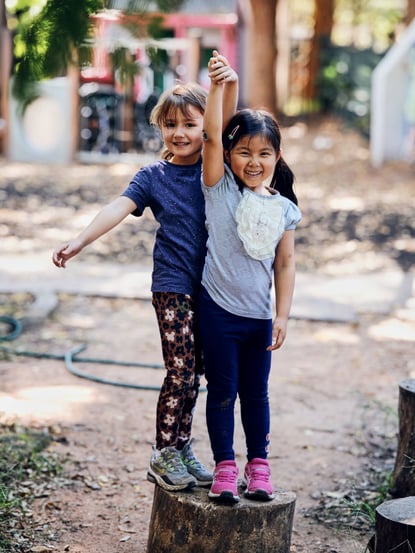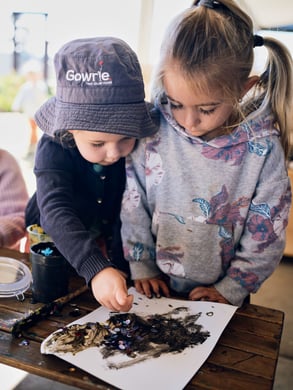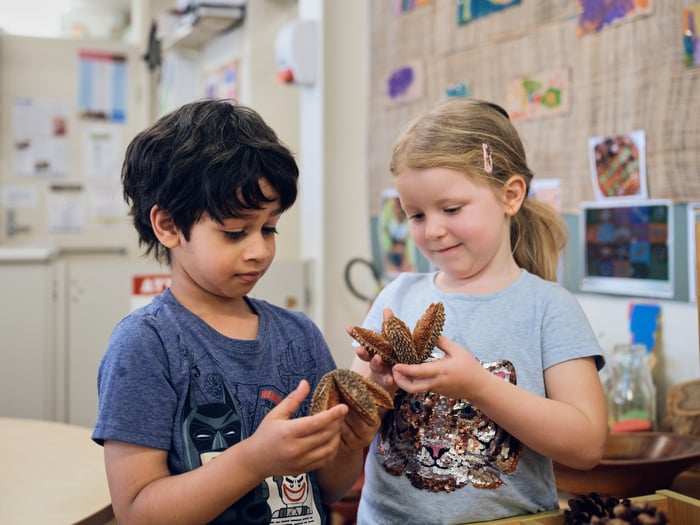Key Points
- Childhood friendships teach skills such as sharing and help children to develop communication skills such as learning to express their emotions.
- By the age of three, children can generally tell you who their friends are. Even if they haven’t yet established any friendships, they will likely show an eagerness to do so. By the age of four, children will be able to differentiate between a friend and someone they just know.
- From a very young age, children see how their parents interact with their own friends. They learn important social cues from this so it’s important that you always model good friendship behaviour
On this page
Supporting early childhood friendships
The benefits of friendship in early childhood
Forming friendships in early childhood: how it happens
The friendship skills that develop during early childhood
How to help children develop and maintain positive friendships
Dealing with friendship problems
Supporting early childhood friendships
While you may no longer be connected with the friends you had as a three-year-old, those friendships played an important role in your development. And probably a bigger role than you even realise.
Childhood friendships teach skills such as sharing and help children to develop communication skills such as learning to express their emotions. Healthy friendships are instrumental in early childhood… but they don’t always come easily for every child.
If you want to support your child to develop and maintain friendships, we share everything you need to know about childhood friendships.

The benefits of friendships in early childhood
Early childhood friendships aren’t just a way to pass the time. They can have real benefits to your child and their development. Here are just five of the benefits of developing friendships in early childhood.
Higher self-esteem
When children have strong friendships with their peers, they are likely to have great self-confidence. Friendships contribute significantly to giving children a good sense of self and higher self-esteem.
Social and emotional support
All through life, friends are the people you can turn to for help with challenging situations and life stresses. This is the case even for children. Having their friends around can help them with big life changes and transitions, such as welcoming a sibling or toilet training.
Social skills development
The best way for children to develop their social skills is by playing with other children and developing friendships. This is how they learn communication, negotiation, conversation, sharing and appropriate behaviour.
Diversity and inclusion
If children attend an early learning centre, there’s a good chance they will make friends with children from a diverse range of cultures and backgrounds. This gives children an early appreciation of diversity and accepting other
Forming friendships in early childhood: How it  happens
happens
Think about your own friendships in life. Some friendships come easily. You immediately click with a person and you become friends instantly. With other people, a friendship forms but it’s a slow burn. And then there are people you meet who never join the friendship ranks.
The same goes for children.
By the age of three, children can generally tell you who their friends are. Even if they haven’t yet established any friendships, they will likely show an eagerness to do so.
By the age of four, children will be able to differentiate between a friend and someone they just know.
You may notice that young children play alongside each other rather than together. This is a normal part of development.
Some children will have a “best friend” or they may have a group of friends. Every child is different and that’s ok.
The friendship skills that develop during childhood
Making friends is a skill. Children also need to learn other skills to keep their friendships ticking.
The good news is, children can learn these skills and form friendships. They just need to be given the opportunities to do so, such as at preschool or on playdates.
Here are some of the friendship skills that your child will develop over time:
- verbal communication
- listening skills
- patience
- empathy
- taking turns
- sharing
- role playing
- cooperation
- emotional development
- responsibility
Your child won’t develop all of these skills at once. It can take some time and they will naturally be stronger in some skills than others. Making friends helps your child to develop and practice these skills.
How to help children develop and maintain positive friendships
 People are social beings. We gravitate toward other people to build social connections and friendships. But that doesn’t mean that you can’t help your child to make new friends and to help them nurture their friendships.
People are social beings. We gravitate toward other people to build social connections and friendships. But that doesn’t mean that you can’t help your child to make new friends and to help them nurture their friendships.
Here are some ideas you might like to consider.
Practice friendship skills
You could start by role-playing how friends behave so your child can practice some of those important skills. When you’re playing with your child, talk about sharing and practice communication skills. This can be particularly helpful for children who are shy or who are having trouble making friends.
Provide opportunities to make friends
If your child attends a preschool or early education and care centre, they will have opportunities to make friends. The educators will also help to nurture friendships. You could also try organising playdates with other children of similar ages. Another option to try is taking your child to playgroup or other organised activities where you can both meet new people.
Encourage your child’s friendships
If your child does make a friend at preschool or another activity, you can encourage this friendship by asking your child about their friend. If it’s possible, you could also organise a playdate at home or arrange to meet at the park. Remember that some children will have many friends while others will only have a few. It’s not so much about the quantity of friends but the quality of the friendships they do have.
Role modelling at home
Never underestimate how much children learn from observing the adults around them. Even if you don’t realise it, they’re always watching and taking their cues from you.
From a very young age, children see how their parents interact with their own friends. They learn important social cues from this so it’s important that you always model good friendship behaviour. This includes avoiding gossip or talking badly about friends, especially if your children may overhear what you’re saying.
Instead, you can role model good social behaviour and friendship skills. You can role model all of those important friendship skills in the way you interact with your child. No doubt you’re doing that without being aware but when you do become aware it helps you to identify skills that your child may need more help in developing.
When you do see those positive friendship behaviours, call them out and praise them for the behaviour. It could be as simple as telling them that they’re a good friend for sharing or acknowledging the way they helped a friend who was upset.

Dealing with friendship problems
Friendship isn’t always easy. Even the best of friends can have little - or big - bumps along the way.
Helping your child to deal with these challenges can actually be one of the most difficult parts of being a parent.
Hurt feelings
There may be times when your child has their feelings hurt. Maybe a friend told them that they couldn’t be friends anymore. Or they were excluded from play by one of their friends. It could even just be a case of your child saying that no one wants to play with them.
Whatever the case, it’s best to be supportive of your child so they know that their feelings matter. Often these types of disputes simply resolve themselves but if the problem persists, or if you’re worried, speak to your child’s educator. They will have insight into what is happening during play or can keep a closer eye on your child.
Aggressive behaviour
Children won’t always get along swimmingly. Disagreements are normal. But children behaving aggressively, e.g. shouting, hitting or pushing, that requires intervention, is not ok.
If the aggressive behaviour occurs during a playdate, you should tell the children to stop and explain why.
Not joining in play
It’s quite common for children to want to play by themselves occasionally. Most children will do this from time to time. If this is becoming a problem because your child doesn’t know how to join in play with their preschool friends, there are some things you can do to help.
Encourage your child by role-playing how to join in on play. Talk with them about ways that can invite other children to play. You can also speak with your child’s educator about giving them some additional support.
At Gowrie NSW, we help every child to discover their potential in a safe and inclusive environment. We provide opportunities for developing and maintaining childhood friendships and support parents in the journey.
Contact us to learn more about our early education and care centres where every child is encouraged for their own unique strengths and character.
Published on 28th April, 2022










.jpg)